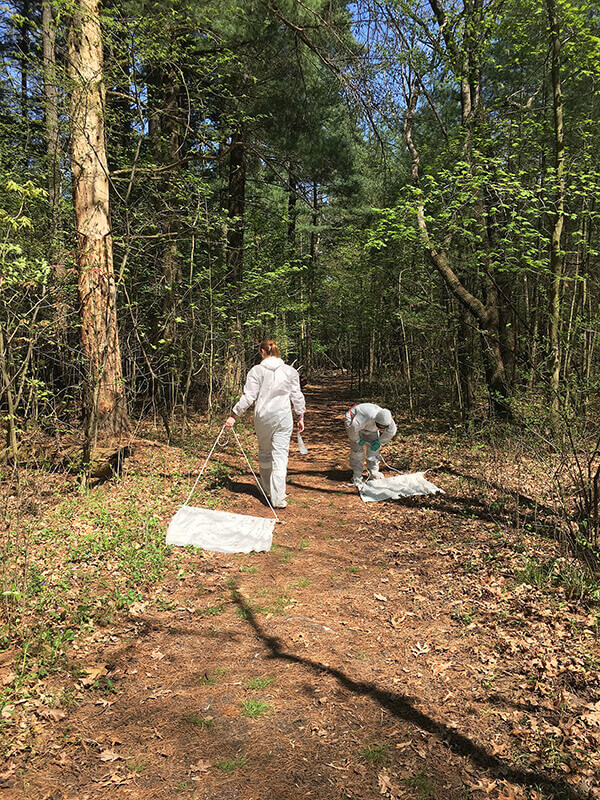February 27, 2019
Indiana students, citizen scientists sought for statewide tick hunts
 Scientists from Purdue's Tick INsiders program, Lauren Hagen (left) and Maria Muriga (right), drag and check tick cloths at Tippecanoe River State Park in 2018. The program is looking for high school students and citizen scientists interested in helping with tick collections this year. (Tick INsiders photo)
Download image
Scientists from Purdue's Tick INsiders program, Lauren Hagen (left) and Maria Muriga (right), drag and check tick cloths at Tippecanoe River State Park in 2018. The program is looking for high school students and citizen scientists interested in helping with tick collections this year. (Tick INsiders photo)
Download image
WEST LAFAYETTE, Ind. – Purdue University’s Tick INsiders program is looking for 50 Indiana high school students and other Indiana residents willing to roll down their sleeves to get involved in a citizen science project.
Cate Hill, a Purdue professor of entomology, leads this effort to analyze the bacteria and viruses in Indiana’s ticks to build an understanding of what they are carrying and how that might impact human health. To do that, she needs volunteers to collect ticks from all over the state.
This year the Tick INsiders program will provide training for up to 50 students. Citizen scientists are also now welcome to collect and send ticks to Hill’s lab.
“It’s really important work. The Centers for Disease Control and Prevention reports that human cases of tick-borne diseases doubled from 2004 to 2016. If we’re going to get a handle on that and develop strategies for reducing tick bites and treating patients, we need to know where our ticks are and what our ticks are carrying around inside them,” Hill said. “That means we need a lot of ticks, and we need help collecting them.”
Three species of ticks – the blacklegged or deer tick, the lone star tick and the American dog tick – are found in Indiana. These ticks can transmit multiple pathogens, nine of which are known to cause human illnesses, though not all have been identified in Indiana. The Indiana State Department of Health reports more than 100 cases of Lyme disease each year and dozens of cases of Ehrlichiosis, anaplasmosis and Rocky Mountain spotted fever.
Research suggests that ticks can carry a cocktail of microbes – bacteria and viruses – that can sicken bite victims and may work in concert to affect the severity of an illness and human immune response.
“Not all tick bites are the same. We don’t know what is passed from a tick to a human each time someone is bitten, which means that health care professionals may need to consider multiple tick-borne pathogens in a person who has been bitten by a tick,” Hill said. “This program improves our knowledge so that we can improve our outcomes.”
The Tick INsiders program is accepting applications from high school students through March 15. Up to 50 students will be selected to take part in a one-day workshop from 9:30 a.m. to 3:30 p.m., March 23, on the Purdue campus to learn tick identification, field collection techniques, sample preparation and ways to send ticks to Purdue for analysis.
Beside the training, last year’s Tick INsiders students visited campus in the fall, touring labs and learning about how their efforts improved understanding of Indiana’s tick populations. Hill said this year’s students will have the same opportunity.
Students interested in the Tick INsiders program should apply at tickinsiders.org/tick-insiders-application. Attending the workshop is not mandatory for participation, but it is strongly encouraged.
Indiana residents interested in participating can collect ticks and send them to Hill’s lab for analysis. Videos on safe and proper collection techniques, as well as how to send ticks will be at https://tickinsiders.org/citizen-science-program.
Writer: Brian Wallheimer, 765-532-0233, bwallhei@purdue.edu
Source: Cate Hill, 765-496-6157, hillca@purdue.edu
Agricultural Communications: (765) 494-8415;
Maureen Manier, Department Head, mmanier@purdue.edu

